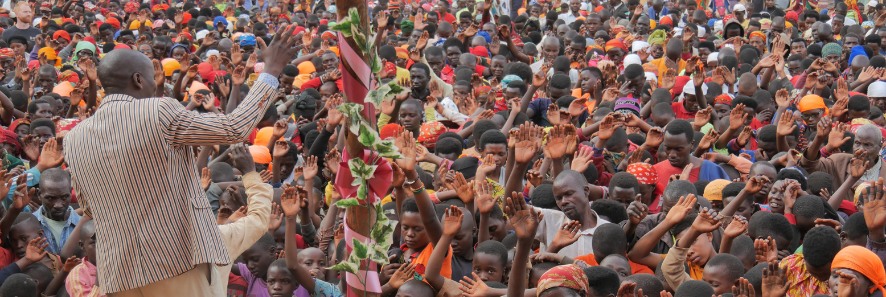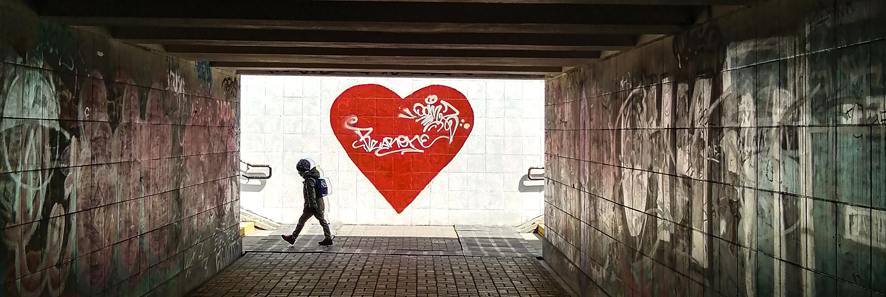This is a sermon from a few months ago given at Spring Harvest in Skegness. My given title was ‘Living in the Light and Living as Light’
Ephesians 5:8-13 ‘For you were once darkness, but now you are light in the Lord. Live as children of light (for the fruit of the light consists in all goodness, righteousness and truth) and find out what pleases the Lord. Have nothing to do with the fruitless deeds of darkness, but rather expose them. It is shameful even to mention what the disobedient do in secret. But everything exposed by the light becomes visible—and everything that is illuminated becomes a light.’
(Skip to 8 mins 46 seconds for the start of the talk. With thanks to Spring Harvest for the video)
Below are some of the stories and quotes I shared:
Christian Fuhrer, pastor of Nikolaikirche in Leipzig, East Germany, committed to pray for peace. Loads of youth showed up to join him. By 1989, there were huge meetings, but sometimes half the congregation was the State Security Police, sent to monitor what was going on. On October 7, the German Democratic Republic (GDR) was due to celebrate its 40th anniversary. President Gorbachev, the author of the movement for openness and Perestroika, attended from the Soviet Union. Naturally, the government did not want the occasion to be used for any kind of public expression of discontent. But in Leipzig, for ten long hours police battered and bullied defenceless demonstrators who made no attempt to fight back. Many were taken away in police vehicles.
In this heightened atmosphere, just two days later, Monday 9th October, the peace prayers were to be held. The government warned protesters that any further demonstrations would not be tolerated. All day long, the police and military tried to intimidate them with a hideous show of force. Schools and shops in the city were shut down. Roadblocks were built. The police had guns loaded with live ammunition. Soldiers with tanks were mobilized and surrounded the central area. Extra beds and blood plasma had been assembled in the Leipzig hospitals. Rumors from many reliable sources circulated that the government intended to use the “Chinese Solution” and repeat the massacre of Tienanmen Square in Beijing.
To neutralize and perhaps disrupt the prayer meeting, 1000 party members and Stasi arrived at the church early. Six hundred of them filled the nave by 2 p.m. But as Führer said: “They had a job to perform. What had not been considered was the fact that these people were exposed to the word, the gospel and its impact! I was always glad the Stasi agents heard the Beatitudes from the Sermon on the Mount every Monday. Where else would they hear these?”
So the stage was set, the actors assembled for the climactic Monday prayer service. Huge numbers came out to pray, not only at the Nikolai Church but at other churches throughout the city, which had joined the peace prayers. During the service, the atmosphere and the prayers were serenely calm. As he prepared to send the people out into the streets, Pastor Führer made a final plea to the congregation to refrain from any form of violence or provocation. The Sermon on the Mount was again read aloud.
As the doors opened for the worshipers to depart, something unforgettable happened…
The 2000 people leaving the sanctuary were welcomed by tens of thousands waiting outside with candles in their hands. That night an estimated 70,000 people marched around the main city streets. Though the police and the military were everywhere, Pastor Führer said: “Our fear was not as big as our faith … Two hands are needed to carry a candle and to protect it from extinguishing. So you cannot carry stones or clubs at the same time.”
It was later reported that Horst Sindemann, a serving member of the Central Committee of the GDR, summed up both the extensive preparations of the authorities as well as their inability to know how to respond to the events of that evening: “We had planned for everything. We were prepared for everything. But not for candles and prayers.” A month later the Berlin Wall was breached, and the whole Communist edifice crumbled away.
From our passage: v11,13 ‘Have nothing to do with the fruitless deeds of darkness, but rather expose them… But everything exposed by the light becomes visible—and everything that is illuminated becomes a light’.
Similar scenes occurred just over a thousand miles away in Romania, where things were heating up, and candles being used there as well. Lead by the incredibly brave Pastor of the Hungarian Reformed Church called pastor Laszlo Tokes, loads of youth were coming to faith, and church membership swelled to 5000.
Authorities stationed police officers in front of the church on Sundays, cradling machine guns. They hired thugs to attack Pastor Tokes. They confiscated his ration book so he couldn’t buy food or fuel. Finally, in December 1989, they decided to send him into exile. But when police arrived to hustle Pastor Tokes away, they were stopped cold. Around the entrance of the church stood a wall of humanity. Members of other churches – Baptist, Pentecostal, Orthodox, Catholic, and others – had joined together to protest.
Though police tried to disperse the crowd, the people held their post all day and into the night. Then, just after midnight, a 19-year-old Baptist student named Daniel Gavra pulled out a packet of candles. He lit one and passed it to his neighbour.
The crowd stayed all through the day – and the next night. Finally police broke through. They bashed in the church door, bloodied Pastor Tokes’ face, and then paraded him and his wife through the crowd and out into the night. But that was not the end. The people streamed to the city square and began a full-scale demonstration against the Communist government. Again Daniel passed out his candles. This was more than the government could tolerate. They brought in troops and ordered them to open fire on the crowd. Hundreds were killed. Young Daniel felt a searing pain as his leg was blown off. But the people of Timisoara stood bravely against the barrage of bullets.
And by their example they inspired the entire population of Romania. Within days the nation had risen up and the bloody dictator Ceausescu was gone.
For the first time in half a century, Romanians celebrated Christmas in freedom.
Daniel celebrated in the hospital, where he was learning to walk with crutches. His pastor came to offer sympathy, but Daniel wasn’t looking for sympathy. “Pastor, I don’t mind so much the loss of a leg,” he said. “After all, it was I who lit the first candle.”
On Friday, December 22nd, Rev. Peter Dugulescu was on a balcony overlooking the city’s opera square when official word came of the overthrow of Ceausescu… the people started to shout, enthusiastically: “God exists!” “There is a God.”
Dugulescu said, “With some 150,000 people in the square, I asked the crowd that in these great, historic and critical moments we should pray together the prayer, ‘Our Father, Who Art in Heaven’. Without being asked to do it, all of them knelt down, facing the cathedral I prayed in the microphone, and they repeated after me.”
Daniel’s candle that lit up an entire country, but it cost him his leg.
Letting your light shine is costly. There will be casualties. But what a line! “Pastor, I don’t mind so much the loss of a leg,” he said. “After all, it was I who lit the first candle.”
You can light that first candle down your street. A candle loses nothing by lighting another candle.
Saint Telemachus, a fourth-century monk who lived in a monastery, felt God calling him to Rome. He couldn’t figure out why God would want him in Rome, but he felt the pressure to go. Putting his possessions in a little satchel, he threw the bag over his shoulder and started out over the dusty, westward roads to Rome. When he got to Rome, people were running about the city in great confusion. He had arrived on a day when the gladiators were going to fight both other gladiators and animals in the amphitheater. Everyone was heading to the amphitheater to watch the entertainment. So Telemachus thought this must be why God had called him to Rome.
He walked into the amphitheater. He sat down among the 80,000 people who cheered as the gladiators came out proclaiming, “Hail Caesar! We die to the glory of Caesar.” The little monk thought to himself, here we are, four centuries after Christ, in a civilised nation, and people are killing one another for the entertainment of the crowd. This isn’t Christian! Telemachus got up out of his seat, ran down the steps, climbed over the wall, walked out to the centre of the amphitheater, and stood between two large gladiators. Putting his hands up, he cried out, “In the name of Christ, stop!” The crowd laughed and jeered. One of the gladiators slapped Telemachus in the stomach with his sword and sent him spinning off into the dust.
Telemachus got up and again stood between the two huge gladiators. He repeated, “In the name of Christ, stop.” This time the crowd chanted “Run him through!” One of the gladiators took his sword and ran it through Telemachus’s stomach. He fell into the dust and the sand turned red as blood ran out of him. One last time, Telemachus weakly cried out, “In the name of Christ, stop.”
He died on the amphitheater floor. The crowd grew silent, and within minutes they emptied out of the amphitheater. History records that, thanks to Saint Telemachus, this was the last gladiatorial contest in the history of the Roman Empire.
Verse 11 of our passage says ‘Have nothing to do with the fruitless deeds of darkness, but rather expose them.’ Saint Telemachus changed the course of history. So can you. God loves to use one person to make a big difference in the world – and God wants to use you.
William Booth’s last speech to Salvation Army: “While women weep, as they do now, I’ll fight. While little children go hungry, as they do now, I’ll fight. While men go to prison, in and out, in and out, as they do now, I’ll fight. While there is a drunkard left, while there is a poor lost girl upon the streets, while there remains one dark soul without the light of God, I’ll fight – I’ll fight to the very end!”
Philippians 2:14-16: ‘Do everything without grumbling or arguing, so that you may become blameless and pure, “children of God without fault in a warped and crooked generation. Then you will shine among them like stars in the sky as you hold firmly to the word of life.’
Paul urges us to “Hold firmly to the word of life!”
What could that mean for you? A young lady working in a factory in Lancashire complained to her vicar: “I cannot stick it out any longer. I am the only Christian in the factory where I work. I get nothing but taunts and sneers. It is more than I can stand. I am going to resign.”
“Will you tell me,” asked the vicar, “where lights are placed?” “What has that to do with it?” the young Christian asked him rather bluntly. “Never mind,” the minister replied. “Answer my question: Where are lights placed?” “I suppose in dark places,” she replied. “Yes, and that is why you have been put in that factory where there is such spiritual darkness and where there is no other Christian to shine for the Lord.”
The young lady realized for the first time the opportunity that was hers. She felt she could not fail God by allowing her light to go out. She went back to the factory with renewed determination to let her light shine in that dark corner. Before long, she was the means of leading nine other girls to the Light.
You can’t blame the dark for being dark, you have to blame the light for not shining on it. Where is God calling you to shine? What might it look like?
Professor Joad, who was converted from atheism to Christ said, “Trying to find happiness from this world is like trying to light up a dark room by lighting a succession of matches. You strike one, it flickers for a moment, and then it goes out. But when you find Jesus Christ, it’s as though the whole room is suddenly flooded with light.”
In Patricia St John’s ‘Treasures of the Snow’, Annette talking to Grandmother: “If you hated someone, you couldn’t ask Jesus to come into your life, could you?” “If you hate someone, it just shows how badly you need to ask Him to come in. The darker the room, the more it needs the light to come in.” “But I couldn’t stop hating Lucien.” “No, you’re quite right. None of us can stop ourselves thinking wrong thoughts, and it isn’t much good trying. But Annette, when you come down in the morning and find this room dark with the shutters down, do you say to yourself, I must chase away the darkness and the shadows first, and then I will open the shutters and let in the sun? Do you waste time trying to get rid of the dark?” “Of course not!” “Then how do you get rid of the dark?” “I pull back the shutters, of course, and then the light just comes in!” “But what happens to the dark?” “I don’t know; it just goes when the light comes!” “That is exactly what happens when you ask Jesus to come in. He is love, and when love comes in, hatred and selfishness and unkindness will give way to it, just as the darkness gives way when you let in the sunshine. But to try to chase it out alone would be like trying to chase the shadows out of a dark room. It would be a waste of time.”
Martin Luther King Jr said, “Darkness cannot drive out darkness; only light can do that. Hate cannot drive out hate; only love can do that.”
Yancey: “It seems to me Christians are too busy trying to stuff up the cracks and correct those imperfections. It’s all right to try to fix our defects, but if it keeps us away from grace, it’s not good. Light only gets in through the cracks.” Come as you are tonight, He will shine through you.
Early 20th century missionaries became known as ‘one-way missionaries’ because they packed all their earthly belongings into coffins and purchased one-way tickets when they departed for the mission field. They knew they’d never return. A.W.Milne felt called to a tribe of headhunters in the New Hebrides (Vanuatu in South Pacific). All the other missionaries to this tribe had been martyred, but that didn’t keep Milne from going. He lived among the tribe for 35 years and never returned home.
When the tribe buried him, they wrote the following epitaph on his tombstone: “when he came there was no light. When he left there was no darkness.” That could be what they say about you in your halls of residence, in the office, classroom, on the team, without the cannibalism! What a privilege!
Living in the light and living as light. George Bernard Shaw: “Life is no brief candle to me. It is a sort of splendid torch which I’ve got ahold of for the moment, and I want to make it burn as brightly as possible before handing it on to future generations.”









